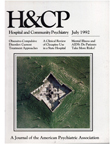Factors Predicting Referral to Inpatient or Outpatient Treatment From Psychiatric Emergency Services
Abstract
Dispositional decisions in ten psychiatric emergency rooms in New York State were examined using logistic regression. Variables influencing recommendations for inpatient or outpatient psychiatric treatment were fairly consistent across the hospitals. All terms used in the regression model were interactions formed from five variables: dangerous behavior as a reason for referral, severity of the mental disorder, the hospital where the patient presented, current signs of psychosis, and a diagnosis of major mental illness. A sixth variable, assaultive behavior in the emergency room, also influenced disposition decisions but could not be considered in the model because all patients with that characteristic were referred for inpatient treatment. A model of disposition decisions based on interactions of variables may be especially powerful because it captures the dynamic combination of factors clinicians encounter.
Access content
To read the fulltext, please use one of the options below to sign in or purchase access.- Personal login
- Institutional Login
- Sign in via OpenAthens
- Register for access
-
Please login/register if you wish to pair your device and check access availability.
Not a subscriber?
PsychiatryOnline subscription options offer access to the DSM-5 library, books, journals, CME, and patient resources. This all-in-one virtual library provides psychiatrists and mental health professionals with key resources for diagnosis, treatment, research, and professional development.
Need more help? PsychiatryOnline Customer Service may be reached by emailing [email protected] or by calling 800-368-5777 (in the U.S.) or 703-907-7322 (outside the U.S.).



